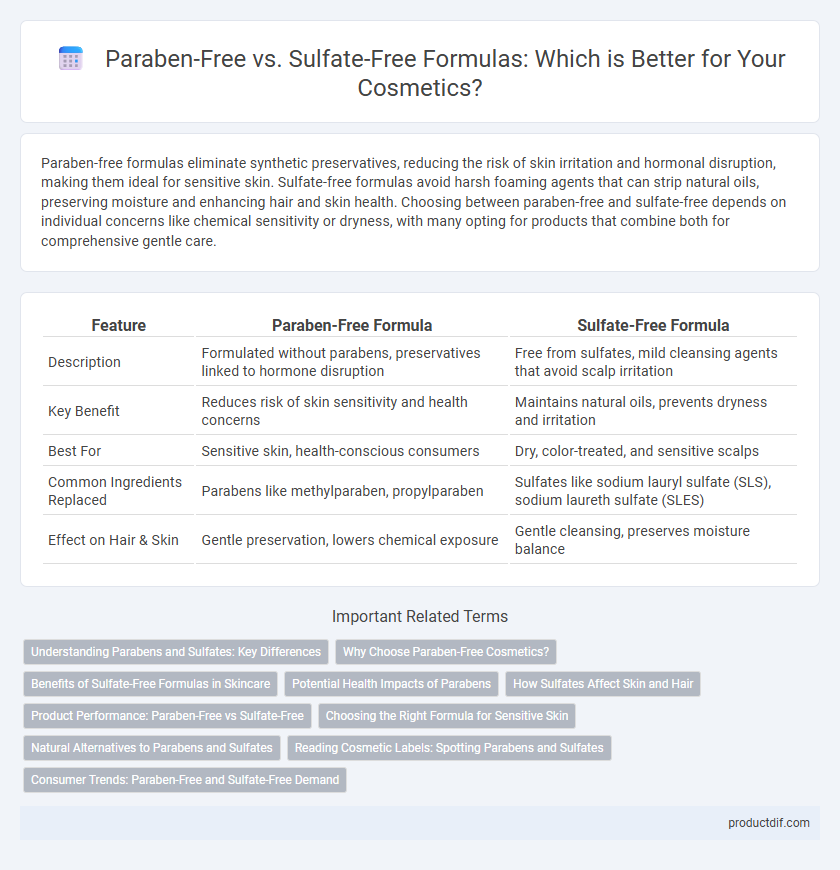Paraben-free formulas eliminate synthetic preservatives, reducing the risk of skin irritation and hormonal disruption, making them ideal for sensitive skin. Sulfate-free formulas avoid harsh foaming agents that can strip natural oils, preserving moisture and enhancing hair and skin health. Choosing between paraben-free and sulfate-free depends on individual concerns like chemical sensitivity or dryness, with many opting for products that combine both for comprehensive gentle care.
Table of Comparison
| Feature | Paraben-Free Formula | Sulfate-Free Formula |
|---|---|---|
| Description | Formulated without parabens, preservatives linked to hormone disruption | Free from sulfates, mild cleansing agents that avoid scalp irritation |
| Key Benefit | Reduces risk of skin sensitivity and health concerns | Maintains natural oils, prevents dryness and irritation |
| Best For | Sensitive skin, health-conscious consumers | Dry, color-treated, and sensitive scalps |
| Common Ingredients Replaced | Parabens like methylparaben, propylparaben | Sulfates like sodium lauryl sulfate (SLS), sodium laureth sulfate (SLES) |
| Effect on Hair & Skin | Gentle preservation, lowers chemical exposure | Gentle cleansing, preserves moisture balance |
Understanding Parabens and Sulfates: Key Differences
Paraben-free formulas eliminate preservatives commonly used to prevent microbial growth, reducing risks of skin irritation and hormonal disruption. Sulfate-free formulas avoid detergents like sodium lauryl sulfate that can strip natural oils, minimizing dryness and sensitivity. Understanding these key differences supports informed cosmetic choices for safer, gentler skin and hair care routines.
Why Choose Paraben-Free Cosmetics?
Paraben-free cosmetics reduce the risk of hormone disruption linked to synthetic preservatives, making them safer for long-term skin health. These formulas minimize allergic reactions and irritation, benefiting sensitive skin types. Choosing paraben-free products aligns with the growing demand for cleaner, more natural skincare solutions.
Benefits of Sulfate-Free Formulas in Skincare
Sulfate-free formulas in skincare offer gentle cleansing without stripping natural oils, which helps maintain the skin's moisture barrier and reduces irritation, especially for sensitive or dry skin types. These formulations minimize the risk of inflammation and dryness commonly associated with sulfates like sodium lauryl sulfate, promoting healthier skin texture and preventing excessive oil production. Using sulfate-free products supports long-term skin health by preserving natural hydration and enhancing the effectiveness of other active ingredients in the skincare routine.
Potential Health Impacts of Parabens
Paraben-free formulas eliminate synthetic preservatives linked to hormone disruption and breast cancer risks, offering safer options for sensitive skin. Sulfate-free formulas primarily target scalp irritation and dryness but do not address endocrine concerns posed by parabens. Opting for paraben-free cosmetics reduces exposure to potential endocrine disruptors, contributing to long-term health benefits.
How Sulfates Affect Skin and Hair
Sulfates, commonly found in shampoos and cleansers, can strip natural oils from the skin and hair, leading to dryness, irritation, and damage to the hair cuticle. Unlike paraben-free formulas, sulfate-free products maintain moisture balance, reduce scalp sensitivity, and preserve hair's natural shine and texture. Choosing sulfate-free cosmetics supports healthier skin and hair by minimizing chemical-induced dryness and inflammation.
Product Performance: Paraben-Free vs Sulfate-Free
Paraben-free formulas prioritize preserving skin integrity by eliminating preservatives linked to irritation, enhancing product safety for sensitive skin. Sulfate-free formulas focus on gentle cleansing without stripping natural oils, improving moisture retention and reducing dryness or irritation. Both formulations offer distinct performance benefits, with paraben-free ensuring safer preservation and sulfate-free providing a milder, hydrating cleansing experience.
Choosing the Right Formula for Sensitive Skin
Choosing the right formula for sensitive skin involves understanding the differences between paraben-free and sulfate-free products. Paraben-free formulas reduce the risk of hormonal disruption and allergic reactions, making them safer for delicate skin prone to irritation. Sulfate-free formulas, on the other hand, cleanse without stripping natural oils, preserving skin moisture and preventing dryness often triggered by harsh surfactants.
Natural Alternatives to Parabens and Sulfates
Natural alternatives to parabens in cosmetic formulations often include plant-based preservatives such as rosemary extract, grapefruit seed extract, and tea tree oil, which provide antimicrobial properties without the risks associated with synthetic parabens. For sulfate-free formulas, gentle cleansing agents derived from coconut oil or sugar, like decyl glucoside and coco glucoside, replace harsh sulfates to maintain skin and hair health while ensuring effective cleansing. These natural substitutes not only reduce irritation and dryness but also align with consumer preferences for eco-friendly and safer cosmetic ingredients.
Reading Cosmetic Labels: Spotting Parabens and Sulfates
Reading cosmetic labels requires careful attention to ingredients like parabens and sulfates, which are commonly used preservatives and cleansers, respectively. Paraben-free formulas emphasize the absence of chemicals such as methylparaben and propylparaben, reducing potential hormonal disruption risks. Sulfate-free products avoid harsh surfactants like sodium lauryl sulfate (SLS), minimizing skin irritation and dryness while maintaining effective cleansing.
Consumer Trends: Paraben-Free and Sulfate-Free Demand
Consumer demand for paraben-free and sulfate-free cosmetic formulas has surged due to growing awareness of ingredient safety and skin sensitivity. Paraben-free products appeal to individuals concerned about potential hormone disruption, while sulfate-free options attract consumers seeking gentler cleansing without irritation. This trend is driving brands to innovate with natural and mild ingredients that cater to health-conscious and eco-friendly preferences.
Paraben-Free Formula vs Sulfate-Free Formula Infographic

 productdif.com
productdif.com